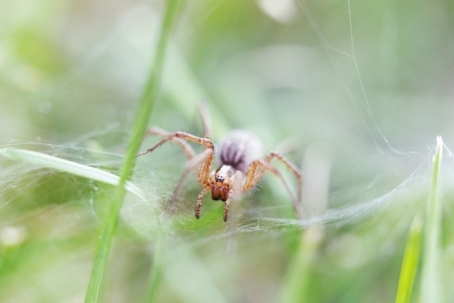Can Grass Spiders Bite?
Yes, grass spiders can bite people and pets.
Do Grass Spiders Bite?
Grass spiders (genus Agelenopsis) are generally not aggressive toward humans or pets, and bites from these spiders are extremely rare. They are more likely to bite only under specific conditions:
Direct handling or accidental contact – If a person or pet disturbs a grass spider by grabbing it, pressing against it, or putting a hand into its web, the spider may bite defensively.
Feeling threatened – Grass spiders bite as a last resort if they feel cornered and cannot escape. This might occur if a spider is trapped in clothing, shoes, bedding, or under a heavy object.
Protecting their retreat – These spiders often construct funnel-shaped webs with a retreat at the end. If a person or pet unknowingly disturbs the retreat, the spider may attempt to defend itself.
Pet interactions – Dogs or cats that paw at webs or chase spiders could provoke defensive bites, although this is uncommon.
Even when grass spiders do bite, their venom is mild and usually causes only minor local reactions, such as redness, itching, or slight swelling. Severe reactions are exceptionally rare.
Grass Spider Bites
Grass spider bites are generally very mild and pose minimal risk to humans and pets:
Severity of Grass Spider Bites
Mild local reaction: Most bites result in minor redness, slight swelling, or localized itching.
Pain: Any discomfort is usually mild and short-lived, similar to a mosquito or ant bite.
Rare systemic effects: Grass spider venom is not potent enough to cause serious systemic symptoms, so fever, nausea, or widespread allergic reactions are extremely uncommon.
Risks Associated
Infection at the bite site: The main risk comes from scratching the bite, which can lead to a secondary bacterial infection.
Allergic reactions: While rare, some individuals may be sensitive to the venom and could develop mild allergic responses, such as more pronounced swelling or itching. Severe allergic reactions are exceedingly uncommon.
Misidentification risk: Sometimes bites from other spiders or insects are mistakenly attributed to grass spiders, which could lead to underestimating more serious bites.
Grass spider bites are mostly a minor nuisance rather than a medical concern.
What Do Grass Spider Bites Look Like?
Grass spider bites are usually very subtle and often go unnoticed. When they do leave a mark, here’s what you can typically expect:
Appearance
Small, red spot: Usually a tiny puncture mark at the site of the bite.
Mild swelling: Slight puffiness around the bite area, often no more than a few millimeters.
Itching or irritation: The area may be itchy or mildly tender to the touch.
Rare bruising: Occasionally a small bruise may appear if the bite caused minor bleeding under the skin.
Duration
Short-lived: Redness and swelling usually fade within a few hours to a couple of days.
Minimal systemic signs: Unlike bites from more venomous spiders, grass spider bites typically do not produce widespread symptoms like fever, nausea, or muscle pain.
Complications
Very rare cases may develop mild allergic reactions, causing slightly larger redness or prolonged itching. Secondary infection is only a risk if the bite is scratched excessively.
Essentially, grass spider bites look very similar to mosquito bites or small insect bites—small, mildly irritated, and short-lived.
What To Do About Grass Spider Bites
If you are bitten by a grass spider, the steps you take are mostly focused on basic wound care and monitoring, as these bites are typically mild:
Immediate Steps
Clean the bite: Wash the area with soap and water to remove any dirt or bacteria.
Reduce swelling: Apply a cold compress or ice pack for 10–15 minutes at a time to help minimize redness and swelling.
Relieve itching or discomfort: Use over-the-counter topical creams (like hydrocortisone) or oral antihistamines if itching or irritation occurs.
Monitoring
Watch for infection: Red streaks, pus, or increasing pain around the bite could indicate a secondary bacterial infection.
Note any unusual reactions: Severe swelling, spreading redness, or signs of an allergic reaction (trouble breathing, dizziness, hives) are extremely rare but require immediate medical attention.
When to Seek Medical Care
If the bite shows signs of infection.
If an allergic reaction develops.
If symptoms persist longer than a few days or worsen instead of improving.
Preventive Tip
Avoid handling spiders and keep areas where they build webs (corners, sheds, tall grass) clear. This greatly reduces the chance of bites.
In essence, most grass spider bites are minor and resolve on their own within a day or two.

